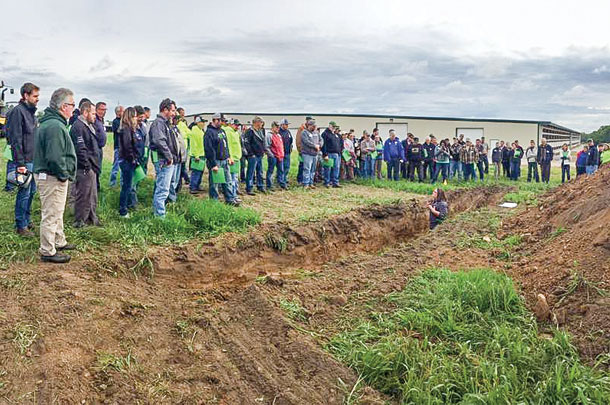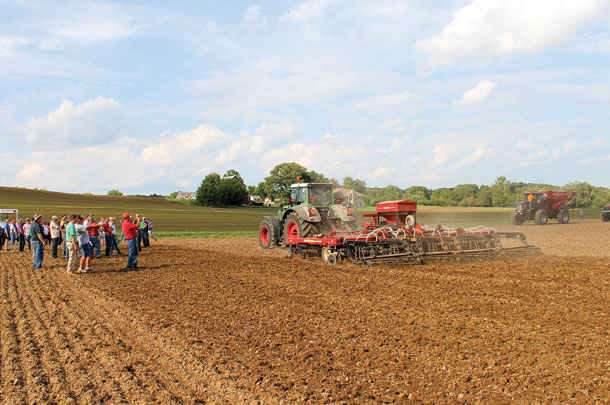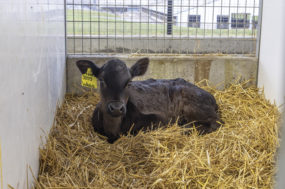See a need Rivers and streams are threatened across rural America. According to the U.S. Geological Survey, agriculture sources contribute over 70 percent of the nitrogen and phosphorus pollution to the Gulf of Mexico via the Mississippi Basin.
In many rural communities, dairy farms are the focus of beach closings, drinking water advisories and fish die-offs. However, American Farmland Trust says well-managed dairy farms offer one of the best solutions for solving water quality issues. While farmers are becoming enthusiastic partners in the fight to keep our waters clean, their license to dairy is increasingly being called into question.
Fill a need
The Professional Dairy Producer Foundation supports programs that maintain public trust in what happens on our farms. Through PDPF funding of farmer-led watershed initiatives, dairy farmers who know their land and how to keep nutrients and sediments on it are voluntarily taking steps to control nutrient and sediment loss to mitigate water quality problems.
The foundation shapes a proactive and prepared dairy community through its support of producer-led watershed initiatives.
Julie Olmstead, University of Wisconsin Extension, defines a farmer-led watershed initiative as a group of farmers organized within a defined watershed with a willingness to play a leading role in addressing the shared environmental concern and a vision for change in the watershed, ideas of how to implement changes and a deep commitment to the cause.
Farmer-led watershed initiatives educate farmers about conservation practices that prevent nutrient and sediment loss on their land through a variety of approaches, depending on the identified goals in the watershed. Farmers themselves determine the best paths to conservation success and recruit and encourage other farmers to participate.
Each watershed initiative identifies a method to reduce nutrients entering the watershed and decides how to measure progress. County Land Conservation staff, UW Extension, NRCS and others collaborate to provide technical assistance, facilitation, information and education, as well as monitor project outcomes. Farmers also work with a nutrient management specialist.
When many farmers take action together, they tip the balance to widespread and lasting farm and watershed health. At last count, there were 31 farmer-led watershed groups in the upper Mississippi River Basin, and new watershed initiatives are currently being formed across the country.
Many government agencies have recognized the unique collaborative model of water quality improvement through farmer engagement and offer grants to farmer-led watershed initiatives.
Visual demonstrations are a powerful tool to show the potential management practices have on increasing soil health and improving the resilience of our soils during damaging weather events. No-till workshops, field demonstrations and rainfall simulation are examples of these well-attended learning experiences.
Cover crop interseeding and seed application, conservation tillage equipment demonstrations and low-disturbance manure application are other common-sense solutions farmers can explore together that benefit the environment.
Some watershed groups offer small incentives to encourage farmers to try new practices. For most dairymen, it is not about the money but, instead, sharing information. They are inspired by neighbors who are a trusted resource, on-farm field days and demonstrations, and the opportunity to try out something together through on-farm research.
Strong farmer-led watershed initiatives engage communities, including local government and non-profits, and are a powerful force for change. The real strength of watershed initiatives is: They are voluntary and not regulatory. Ultimately, the best water quality will depend on farmer willingness to voluntarily develop and implement non-point runoff abatement projects. ![]()
The following update is provided by the Professional Dairy Producers Foundation, which raises funds nationwide and awards grants and sponsorships for educational programs and initiatives that benefit the U.S. dairy community. PDPF is committed to uniting the dairy community on issues of common concern to achieve its vision of a professional, proactive and prepared dairy community.
Did you know?
The Professional Dairy Producers Foundation funds farmer-led watershed initiatives because they can be replicated in any watershed by communities with a commitment to working together to voluntarily improve water quality nationwide. This is dairy controlling its own destiny and addressing the ongoing needs of the dairy community.
Through its competitive grant program, PDPF supports educational activities that help the dairy community develop its people and maintain public trust. The next granting period is ongoing with grant applications due Dec. 1, 2017, and July 1, 2018. Organizations may apply for grants of up to $5,000. For more information, visit Professional Dairy Producers Foundation.
“A key part of the message is: Farmers need to stand up and own the water quality challenges in their watersheds. They need to become leaders in seeking solutions and not sit back and allow others to define not only the issue but also the solutions.

The success of Yahara Pride Farms is: They accepted that phosphorus loss from agricultural fields is an issue, and they evaluated different methods of controlling phosphorus loss. They didn’t wait for agencies to tell them what had to be done; they clearly defined the challenges and then looked for a number of ways to correct the problem.
They clearly sought out different solutions for different farming systems while respecting what each farmer feels is important on their farm.”
—Dennis Frame, Timber Ridge Consulting

“Farmers by nature are innovative problem-solvers. We can be most effective by working toward solutions in a collaborative manner. We will empower farmers with knowledge, training and shared experiences, and we will demonstrate how the agricultural community is committed to doing its fair share in making improvements.”
—Don Niles, Peninsula Pride Farms



